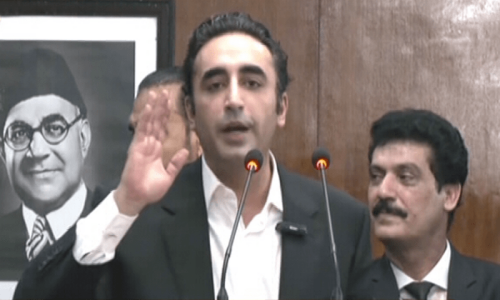KARACHI: The Pakistan Peoples Party on Tuesday rejected judicial activism and called the establishment of a constitutional court in the country “indispensable and important” for solving constitutional problems, including the balance of powers between parliament, judiciary, establishment and executive and judicial reforms.
The human rights cell of the PPP organised a dialogue on judicial reforms and the proposed constitutional amendment package at the Committee Room of the Sindh Assembly. Chaired by PPP-Sindh president Nisar Khuhro, the event was attended by MNA Nafisa Shah, Senator Zamir Ghumro, Local Government Minister Saeed Ghani, rights activist Anis Haroon and others.
The speakers said that they wanted the supremacy of parliament and the Constitution to be established in the country.
Speaking at the session, Mr Khuhro asked why the constitutional court couldn’t be established if the Federal Shariat Court could be established.
“In the current situation, judicial reforms and the establishment of a constitutional court have become inevitable and the need of the hour,” he added.
Speakers reject judicial activism
The PPP provincial chief said that the balance of powers should be maintained between the parliament, judiciary, the establishment and the executive. “Establishment of the constitutional court will reduce the pressure of cases on the Supreme Court as it will hear only constitutional matters,” he added.
Mr Khuhro said that the status of the apex court would not be reduced by the establishment of the constitutional court. “Whoever the chief justice of the Supreme Court is, he will be an independent judge of the independent judiciary,” he said, adding that with the establishment of the court, the equal representation of the judges of each province would give confidence to each province and the provinces would also be able to refer to the constitutional court for their constitutional rights.
He said that steps were being taken to amend the Constitution to strengthen the parliament. “That is why the establishment of the Truth and Reconciliation Commission should also be implemented,” he added.
The PPP leader said that dictators were imposed on the country for 11 years under the doctrine of necessity and the court protected four martial laws in the past, while the framer of the constitution was hanged in a false case.
He said that former military dictator Pervez Musharraf was given the authority to amend the constitution by the same court, but in the past, the judiciary apologised only once for protecting martial law, while it had to apologise every month for protecting martial laws.
Mr Khuhro said that the judicial reforms and establishment of a truth and reconciliation commission were a part of the party manifesto and the charter of democracy which they want to implement.
He said PPP chairman Bilawal Bhutto-Zardari was consulting with leaders of other political parties including Maulana Fazlur Rehman for the constitutional amendment.
“Chairman Bilawal and the leaders of other political parties will soon reach a consensus regarding the constitutional amendments,” he said, adding that the 18th Amendment was approved by consensus and the 26th Constitutional Amendment regarding the establishment of the constitutional court would soon be presented in the parliament and approved by the same consensus.
Speaking on this occasion, MNA Nafisa Shah of the PPP said that under the leadership of the PPP chairman, consultation with political parties regarding the constitutional amendment was going on.
“Before the 18th Amendment, Pakistan had a situation of uncertainty and in the past there was interference in politics by the establishment and the judiciary supported it,” she said, adding that the uncertainty in the past was due to the nexus of the establishment and the judiciary.
Ms Shah said that in the past, the court gave birth to the doctrine of necessity and the dictators corrupted the Constitution, which was also protected by the judiciary.
“The judiciary also removed elected prime ministers from their positions,” she said and added that there should be a balance of powers in the parliament, judiciary and executive.
She was of the view that judges should not be appointed by the judiciary itself, but parliament should also play a role in it. “The constitutional court should be independent so that judicial activism is reduced and political stability is brought to the country,” she added.
PPP Human Rights Cell General Secretary Malaika Raza said that the PPP chairman was consulting with the civil society on the establishment of the Constitutional Court.
“We are looking for consultation and coordination,” she said and added that constitutional courts had been established all over the world for constitutional matters.
Published in Dawn, October 2nd, 2024













































